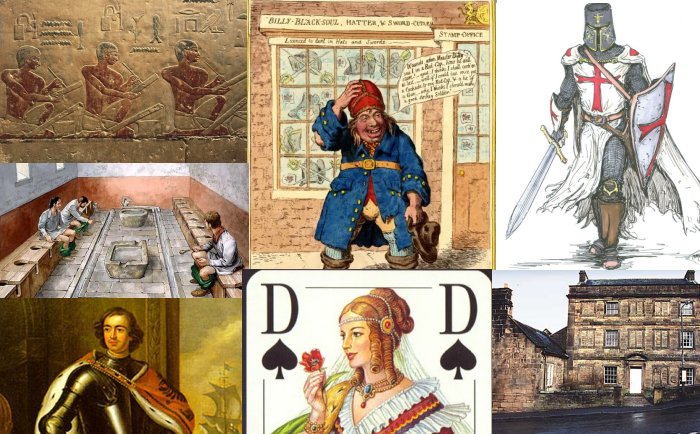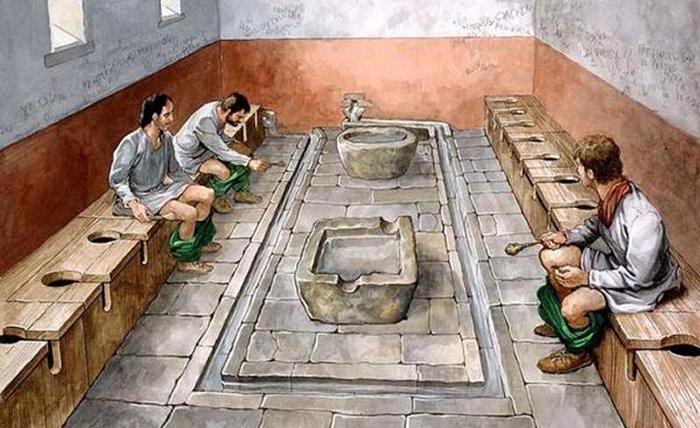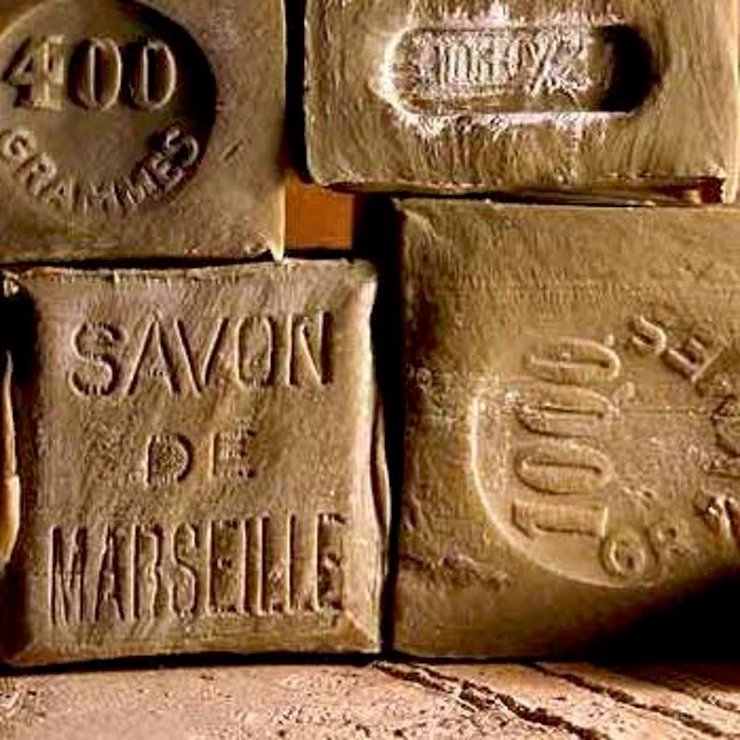10 Most Bizarre Forms Of Ancient Taxes: Surprising And Funny
AncientPages.com - Historical records reveal a number of truly bizarre forms of taxes people had to put up with. Taxation problems date back to earliest recorded history and as astonishing as it may sound, almost anything has been taxed.
In this top list, we have collected a list of some of the weirdest taxes that were imposed in various countries. Prepare yourself for a surprise and some laughter too.
1. Cowardice Tax In Medieval England
A medieval knight in England was in most cases honored to be to be called up to war in service of the King. It was a knight’s duty to oblige when the King demanded him to go to was, but of course there were also knights who refused.
People who did not want to fight for the sake of the King had to pay scutage, popularly know as cowardice tax. This tax existed in England under King Henry I who reigned 1100–1135.
The cowardice tax was initially relatively low, however King John picked it up by 300% and began to take it from all of the knights in those years in which there were no wars. The cowardice tax existed for about 300 years and was eventually replaced by other ways of fund-raising.
2. Ancient Egyptian Tax On Cooking Oil
Egyptians did not have coined money, so their taxes were levied on harvests and property.
During one period a tax was imposed on cooking oil. Ancient Egyptian people tried to slip and slide out of it, but Egyptian Pharaoh’s tax collectors, known as scribes visited the house to make sure that citizens were not re-using their fat, or cooking with cheaper alternatives to avoid the cooking oil tax.
The tax was paid to the Pharaoh, who also owned the oil!
3. Tax On Urine In Ancient Rome
In ancient Rome, human urine was a valuable commodity. Urine was used for a variety of reasons such as tanning, laundering, and even teeth brushing!
Emperor Vespasian (r. A.D. 69-79) and Emperor Nero (r. A.D. 54-68) discovered a golden opportunity to profit from pee. They levied a tax on the acquisition of urine. The result of the urine tax led to the popular Latin phrase Pecunia non alet which means Money does not stink.
4. Window Tax In England
In 1696, England implemented a window tax. Each household had to pay tax based on how many windows the house had.
As a result of this, many houses had few windows and it was very cold indoors. Eventually this became a health problem and ultimately led to the tax’s repeal in 1851.
5. Beard Tax In Russia And England
Shave or pay tax! That was the choice men had in 1698 when Peter the Great, a Russian czar in the late 17th century imposed a tax on the beard that in his opinion was an old-fashioned choice. However, Peter the Great was not the first to introduce tax on facial hair.
In 1535, King Henry VII levied a tax on facial hair with the amount depending on status. The fee increased relative to the beard owner’s place in society. The beard-wearing Henry was exempt, of course. In England, facial hair became a symbol of stature.
6. Tax On Candles In England
In 1789, England introduced a tax on candles. People were forbidden from making their own candles unless they obtained a license and then paid taxes on the candles they produced. The tax was repealed in 1831, leading to a more widespread popularity of candles.
See also:
10 Fascinating Facts About Pharaohs
7. Tax On Hats In England
In 1784, the British government attempted to force men wearing a hat to pay tax. The tax was introduced during the first ministry of Pitt the Younger.
The tax depended on how expensive the hat was. The government assumed that the rich would have a large number of expensive hats, whereas the poor might have one cheap hat or none at all. The hat tax lasted until 1811.
8. Soap Tax During The Middle Ages
Being poor during the Middle Ages meant one was dirty. There was a tax on soap and many of the lower classes could never afford to pay it. The soap tax remained in effect for a very long time and Great Britain did not repeal it until 1835.
9. Tax On Playing Cards In England
Playing cards were taxed as early as the 16th century, but in 1710, the English government dramatically raised taxes on playing cards and dice. This led to widespread forgeries of playing cards to avoid paying taxes. The tax was not removed until 1960.
10. Chinese Head Tax In Canada
This tax cannot be labeled funny. For nearly 40 years, Canada imposed a tax on all immigrants from China. The Chinese Head Tax was Canada’s attempt to stop the large influx of Chinese immigrants who came north from San Francisco following the gold rush to the Fraser River Valley in 1858.
The tax was unfair and the Chinese were underpaid. No other ethnic group had to pay anything, but the Chinese were forced to pay $50, an amount that later rose to $500 by 1903.
See also:
Truly Bizarre And Most Fearsome Ancient Helmets Ever Seen
After settling the Chinese earned only $1 and that was half the wage white men would have earned.
The Canadian federal government collected about $23 million from the Chinese head tax.
Copyright © AncientPages.com All rights reserved. This material may not be published, broadcast, rewritten or redistributed in whole or part without the express written permission of AncientPages.com
Expand for referencesMore From Ancient Pages
-
 10 Ancient Love Symbols
Featured Stories | Mar 2, 2023
10 Ancient Love Symbols
Featured Stories | Mar 2, 2023 -
 Strange Ancient Underground Mystery In Connecticut Baffles Residents And Scientists
Featured Stories | Jun 3, 2024
Strange Ancient Underground Mystery In Connecticut Baffles Residents And Scientists
Featured Stories | Jun 3, 2024 -
 Cajamarca, Peru: Three Archaeological Sites – Identified
Archaeology | Aug 24, 2015
Cajamarca, Peru: Three Archaeological Sites – Identified
Archaeology | Aug 24, 2015 -
 Biblical Mystery Of Urim And Thummim: God’s Puzzling Communication Devices
Ancient Mysteries | Jun 18, 2017
Biblical Mystery Of Urim And Thummim: God’s Puzzling Communication Devices
Ancient Mysteries | Jun 18, 2017 -
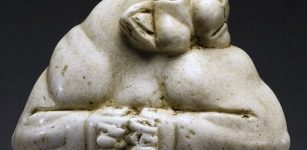 Amazing ‘Guennol Lioness’ – One Of The Greatest Ancient Works Of Art Of All Time
Artifacts | Sep 6, 2018
Amazing ‘Guennol Lioness’ – One Of The Greatest Ancient Works Of Art Of All Time
Artifacts | Sep 6, 2018 -
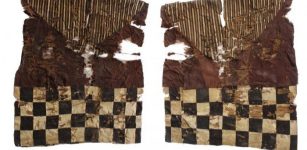 Rare And Well-Preserved Inka Tunic Discovered In Chile
Archaeology | Feb 14, 2023
Rare And Well-Preserved Inka Tunic Discovered In Chile
Archaeology | Feb 14, 2023 -
 Weapons Left By Barbarian Tribes Discovered In Polish Forest
Archaeology | Jan 26, 2024
Weapons Left By Barbarian Tribes Discovered In Polish Forest
Archaeology | Jan 26, 2024 -
 Mysterious Kola Pyramids Built By An Unknown Lost Ancient Civilization Can Rewrite Ancient History
Civilizations | Aug 3, 2020
Mysterious Kola Pyramids Built By An Unknown Lost Ancient Civilization Can Rewrite Ancient History
Civilizations | Aug 3, 2020 -
 Askeladden – Little Trickster That Succeeds Where All Others Fail
Featured Stories | Mar 23, 2018
Askeladden – Little Trickster That Succeeds Where All Others Fail
Featured Stories | Mar 23, 2018 -
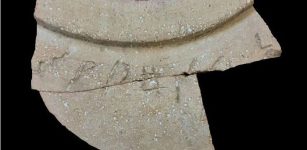 Puzzling Sabaean Inscription Found On A Large Clay Jar Near The Jerusalem Temple Deciphered
Archaeology | Apr 4, 2023
Puzzling Sabaean Inscription Found On A Large Clay Jar Near The Jerusalem Temple Deciphered
Archaeology | Apr 4, 2023 -
 Evidence Ancient Civilizations Had Knowledge About Planets In Our Solar System Thousand Years Ago
Ancient Mysteries | Mar 10, 2021
Evidence Ancient Civilizations Had Knowledge About Planets In Our Solar System Thousand Years Ago
Ancient Mysteries | Mar 10, 2021 -
 Mysterious Utah: Prehistoric Ancient Petroglyphs Of Santa Clara River Reserve
Civilizations | Oct 2, 2018
Mysterious Utah: Prehistoric Ancient Petroglyphs Of Santa Clara River Reserve
Civilizations | Oct 2, 2018 -
 Roman-Era Female Statue Dated Back To 1,800 Years Ago Unearthed In Anemurium, Türkiye
Archaeology | Nov 14, 2023
Roman-Era Female Statue Dated Back To 1,800 Years Ago Unearthed In Anemurium, Türkiye
Archaeology | Nov 14, 2023 -
 Mysterious Ancient Tracks In Rock, Strange Legend And Hidden Treasure – A Puzzle From Arkansas
Featured Stories | Sep 3, 2024
Mysterious Ancient Tracks In Rock, Strange Legend And Hidden Treasure – A Puzzle From Arkansas
Featured Stories | Sep 3, 2024 -
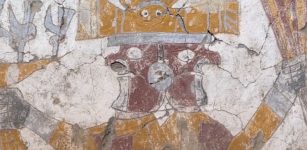 Ancient Murals Of Mysterious Two-Faced Beings And Supernatural Creatures At Pañamarca, Peru
Archaeology | Mar 21, 2023
Ancient Murals Of Mysterious Two-Faced Beings And Supernatural Creatures At Pañamarca, Peru
Archaeology | Mar 21, 2023 -
 Story Of David And Goliath Linked To Horvat Qeiyafa In The Valley Of Elah, Israel
Archaeology | Feb 22, 2022
Story Of David And Goliath Linked To Horvat Qeiyafa In The Valley Of Elah, Israel
Archaeology | Feb 22, 2022 -
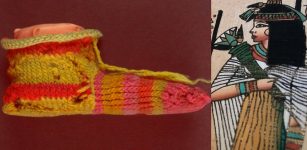 Ancient Egyptians Used Stripy Socks And May Have Invented Them
Ancient History Facts | Dec 5, 2018
Ancient Egyptians Used Stripy Socks And May Have Invented Them
Ancient History Facts | Dec 5, 2018 -
 Evidence Of The Moon-Eyed People – More Clues – Part 2
Ancient Mysteries | Dec 29, 2019
Evidence Of The Moon-Eyed People – More Clues – Part 2
Ancient Mysteries | Dec 29, 2019 -
 Unknown Biological Entities And Disturbing Weather Phenomenon In Washington Still Baffle Scientists
Featured Stories | Jul 23, 2019
Unknown Biological Entities And Disturbing Weather Phenomenon In Washington Still Baffle Scientists
Featured Stories | Jul 23, 2019 -
 Vedic God Indra: Ruler Of Heavens And Tough Warrior Who Kills Evil Serpent Vritra
Featured Stories | Feb 1, 2019
Vedic God Indra: Ruler Of Heavens And Tough Warrior Who Kills Evil Serpent Vritra
Featured Stories | Feb 1, 2019

